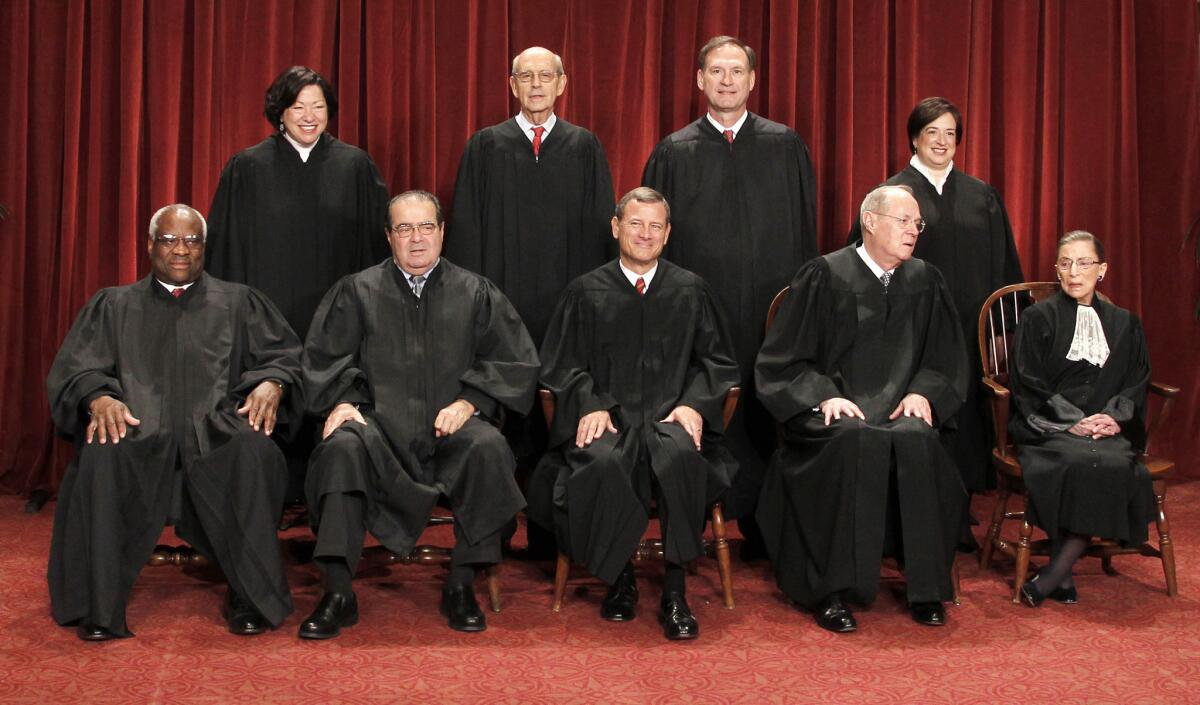Argentina asks U.S. Supreme Court to hear debt case

- Share via
Argentina has formally asked the U.S. Supreme Court to review an adverse appeals court ruling, the latest twist in the nation’s decade-long fight concerning nearly $100 billion in defaulted debt.
The South American nation filed the request, called a writ of certiorari, on Monday, according to Telam, Argentina’s government-owned national news agency.
The country has been litigating with a small group of creditors in U.S. courts over a small portion of the total debt, which Argentina stopped paying in 2001. Holders of 92% of that debt agreed in 2005 and 2010 to exchange their bonds for new ones worth significantly less.
The writ, filed during the high court’s busiest week of the year, asks for a review of an Oct. 26 decision by the 2nd U.S. Circuit Court of Appeals.
That body had upheld a federal judge’s ruling that Argentina violated terms of its debt agreements with creditors who rejected the settlement and instead sued. Judge Thomas Griesa ordered Argentina to pay those so-called holdouts at par, an amount now well more than $1.3 billion.
The Supreme Court request does not apply to a related ruling, before the same circuit court, that is pending with a ruling expected soon. Until it makes a decision in that matter -- concerning the manner that Argentina must pay creditors -- the court has placed a stay on Griesa’s order that Argentina pay the holdouts.
Argentina’s Economy Ministry told Telam late Monday that it had waited to file the writ as long as it could in anticipation of a new circuit court ruling but ultimately felt it had to act. The ministry added that the pending circuit court ruling “could also be the object of a request to the Supreme Court.”
The debt fight concerned the sovereign rights of nations, the ministry said: “It’s hard to conceive of an issue that’s more irritating to a foreign state and the international community than an order from the court of one country to another country regarding topics that go to the heart of the definition of sovereignty.”
The closely watched case has been a point of fascination for international financiers, who believe it could bolster the rights of creditors in disputes with sovereign issuers over distressed debt. Some investors strategically purchase such debt at deep discount on the secondary market in hopes of reaping large returns, frequently through litigation.
One such fund, Elliott Management, holds a large share of the unexchanged Argentine debt and has been a leading force in the dispute with the nation of 40 million people.
Last fall, Elliott and other creditors were able to convince a court in Ghana to seize an Argentine military vessel at port in an attempt to recover assets they say they are owed. The Libertad was ultimately released, and last week Ghana’s supreme court ruled that the lower body had been in error in agreeing to hold the tall-ship in the first place.
Elliott has also helped fund a public relations and lobbying group based in Washington, the American Task Force Argentina, that regularly disseminates critical coverage of the country.
Earlier this month, that group was embroiled in a controversy after it took out advertisements in the Washington Post and Politico linking the debt controversy to a 1994 terrorist bombing of a Jewish cultural center in Buenos Aires and, separately, accused the country of being a narco state. “It is time to stop Argentina from ongoing violations of U.S. and international laws,” one ad stated.
Anti-poverty groups, including Jubilee USA, have also been monitoring the case. They believe that if U.S. courts force Argentina to fully repay the remaining creditors, it would make it virtually impossible for other countries to restructure debts they can no longer afford to pay.
Numerous friend of the court briefs have been filed in the case, including several by the U.S. Dept. of Justice, which has argued that Argentina should not be forced to pay the holdouts.
Despite the high-profile nature of the matter, there is no guarantee the Supreme Court will take the Argentina case. Each year, more than 7,000 writs are filed, of which the high court accepts between 100 and 150.
ALSO:
Argentina is cautionary tale as U.S. debates debt limit
Bondholders spark U.S. legal drama over Argentine debt
Supreme Court strikes down key portion of voting rights act
More to Read
Inside the business of entertainment
The Wide Shot brings you news, analysis and insights on everything from streaming wars to production — and what it all means for the future.
You may occasionally receive promotional content from the Los Angeles Times.








